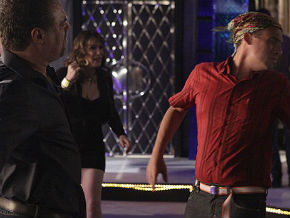The end of the soap opera "Salve Jorge" presented an absurd scene. Russo, a bad, aggressive, violent, inhumane and dangerous character, was arrested and tortured.
When I saw that one of the police officers called the girls he attacked and threatened throughout the soap opera to go to the room where he was handcuffed to the bed rails in his underwear, I immediately thought: they were going to make fun of him! I naively thought that she had exchanged her clothes with his. But I didn't imagine it would be anything hilarious.
What was seen when the girls entered the room is something quite common in Brazil, but it should be unacceptable. The police officer, contradictorily, warned that the police could not know what would happen there, and suggested that the girls return all the aggression they suffered. The torture scene began with the protagonist of the plot giving the first slap. Then it was the others' turn to slap, punch and punch the immobilized person.
Taking the law into your own hands doesn't seem threatening at all in prime time. The gestures of violence were committed amid laughter and laughter from the characters. The imposition of physical pain simply for the pleasure of the person torturing seemed to please fans of the soap opera, after all, I didn't see anyone on social media complaining that they felt offended by the images, on the contrary. Some comments referred to the scene as something "everyone" wanted to participate in.
Criticizing and combating torture is not the same as saving bad or guilty people. Holding people responsible with justice and discernment is necessary, it is not about freeing anyone from their guilt. Even because, the important thing to understand is that there is no certainty that today's torture (which afflicts others) in the next moment cannot fall on ourselves.
If overcoming evil by reproducing evil is pleasant in the eyes of most viewers, how can we think of a world in which people suffer less or are less violent? Fiction has power and as much as some may say, "ah, but it's an innocent work, with the aim of entertainment", it produces and reproduces truths, it is in a space of disputes and defenses of values that are in no way naive.
If that weren't true, we wouldn't hear: "Nobody wants to see a gay kiss on a soap opera." In a society where violence is naturalized, it is even more difficult to value the multiple expressions of affections and desires. Nor is it easy to understand that the soap opera chooses to reproduce an absurd and dangerous culture, to the detriment of less authoritarian and aggressive expressions.
The beating that Russo received from the women was not fair, because justice is served in other ways. It is not fair for us to argue that aggression is legitimate when the culprits are the victims, just as it is not fair for the expression of love (such as a kiss) to be understood as illegitimate when it comes to fagots.
It seems even more serious to me that women police officers reach positions of power, such as police chiefs and police officers investigating the plot, and reproduce the same illegal and violent pattern as some male police officers. Obviously, one cannot, in an essentialist way, expect them to act differently simply because they are women, but this shows that it is not enough to get there. Women in positions of power like these must take on the same challenge as men who have been there longer: comply with the law, respect everyone's human rights, and enforce justice in the way it has been legally established.
According to one journalistic article from Isto é magazine, "There are no reliable figures on torture in the country. As it is a crime committed, in general, by police officers or prison guards, victims are afraid to report it."
In this same article, the truth about the reality of this type of violence in Brazil was told by Margarida Pressburger, member of the UN: "Torture in the country is cultural, widespread and systematic. It began during the period of slavery and continues to this day." She further stated: "The Brazilian vocation for torture has solidified because torturers are not punished."
In the soap opera, as in real life, police torture was not punished; not even reported. So, while gay kissing seems offensive and inappropriate, we are swallowing violence that is consensual and coated with legitimacy, when in fact, it should be recognized as an affront to our way of thinking about a less violet and more just society, for everyone.
*Tiago Duque is a sociologist and has experience as an educator in different areas, from teacher training to street social education. Milita no Identidade – Fight for Sexual Diversity Group. He likes to think and act with those who want to do something new, in search of another possible world.



